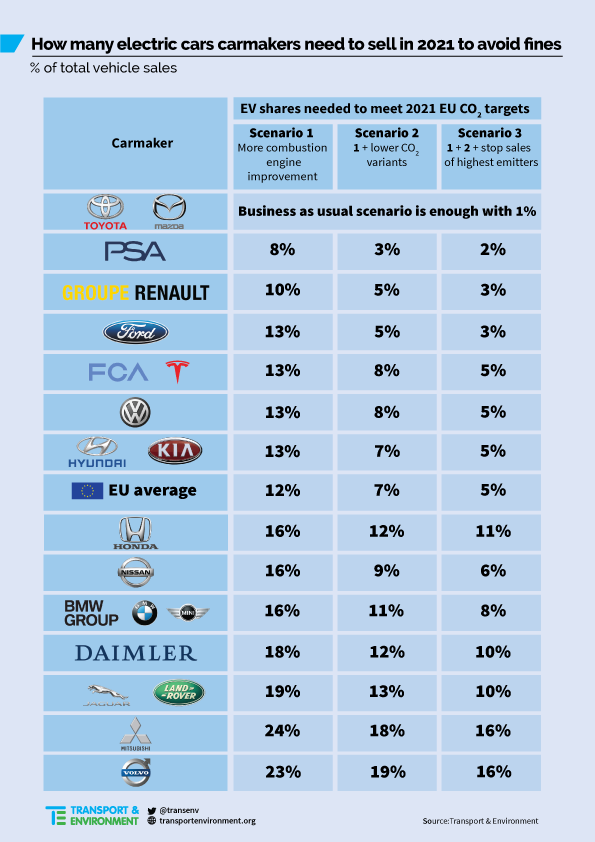
Interested in this kind of news?
Receive them directly in your inbox. Delivered once a week.
Manufacturers have been slow to bring down their fleet average emissions as they prioritised sales of lucrative, but inefficient and higher-emitting, SUVs until the last possible moment. But now data from industry analysts IHS Markit anticipates a tripling of EV models by 2021, meaning carmakers will be able to meet the 2020 and 2021 climate targets if they stick to their own production plans for zero emission and plug-in hybrid models.
Some carmakers may also need to offer customers slightly less powerful engines, or reduce sales of their most polluting models.
Toyota is best positioned to reach its target thanks to its early investment in hybrid technology – 56% of its EU sales are now non-rechargeable hybrids. The Renault-Nissan Alliance is also not far off, mainly due to an early commitment to sales of EVs such as the Nissan Leaf and the Renault Zoé.
European giant Volkswagen could comply through a variety of options such as improving its combustion engines and a major roll-out of EVs through its all-electric ID.3. However, Honda, Ford and Hyundai-Kia face the greatest challenges to comply, although the latter has recently begun a significant ramp up of its EV and hybrid portfolio and sales.
Volvo also has a large gap to close but can make it by shifting a large part of its fleet to plug-in-hybrid technology. Fiat-Chrysler would likely not be able to meet its target but will now comply thanks to its pooling arrangement with Tesla.
T&E’s clean vehicles director, Julia Poliscanova, said: ‘For years carmakers did nothing to reduce their emissions. Now, thanks to the EU car CO2 law, they are finally preparing to start selling the more fuel efficient and electric cars the climate emergency demands. This means we are going to see good quality, affordable EVs in the next year or two, not 10, and that’s excellent news for consumers who’ll be saving lots of money at the pump.’
The report also finds that the recent increase in CO2 emissions from new cars is mainly due the SUV sales boom and not the collapse in diesel car sales. Since 2013 the take-off in SUV sales has resulted in a 2.6g of CO2/km increase, 10 times more than the increase of 0.25g of CO2/km attributed to the decline in diesels. Sales of SUVs in Europe have rocketed from a 7% marketshare in 2009 to 36% in 2018 and are expected to reach nearly 40% by 2021.
National motor taxes significantly influence which cars are bought in each member state and, therefore, the emissions from road transport. The Netherlands has one of the highest shares of EVs in Europe, aided by vehicle taxes that strongly reward buying zero-emission models.
Julia Poliscanova said: ‘The climate emergency requires selling the last combustion engine car by the early 2030s, so governments need to focus on accelerating the switch to cleaner cars beyond what is required by the car CO2 law. Their focus should now be on rapidly electrifying company car and taxi fleets, tax schemes that reward buying zero emission cars and penalising those choosing gas guzzlers, and facilitating the roll out of charging points at home, at work and along motorways.’
Transport is Europe’s biggest climate problem, representing more than a quarter (27%) of the bloc’s total greenhouse gas emissions. Cars emit 44% of transport emissions and are still rising due to the business decisions made by carmakers. If the EU is to achieve the Paris agreement goals of limiting global temperature rise to 1.5ºC, car emissions must be zero by 2050 at the latest, meaning the last diesel or petrol car should be sold ideally by 2030, and by 2035 at the latest.


